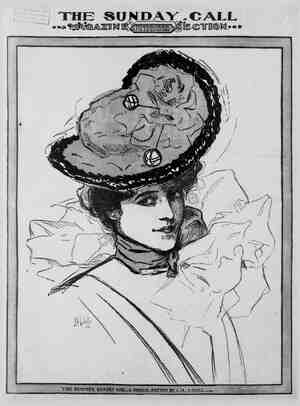The San Francisco Call. Newspaper, June 8, 1902, Page 8
You have reached the hourly page view limit. Unlock higher limit to our entire archive!
Subscribers enjoy higher page view limit, downloads, and exclusive features.
THE SUNDAY CALL. ow summer the days are long and will sood be with us again, the toilers of the city feel more th the restraint of the shop or office and would fain hie thems wood tree, to ever ves to fresh, invigorating air of the country spend a day of peace and quiet recpation. The guestion But few of us can d labor for more where make a re- yet have some week and you will 1 spots for a day’s ust for the read- the “alifornia special- e the the outing folk whe able to the r allurements of the not far a b he wooded hills de g c n-bed t ap- ind educated to wWoc and forms aiso to the tired y of the smoke and t to find reete: influences of venat r portion of the bed of the e at this season of the year can be ©XpIored WIlLOUL wiicwily und the trav- eler will find his task fully recompensed ‘n enjoyment. There are pools innumer- &ble, cool retreats and sunny openings beneath the follage of the tall trees that form & roof of green over the trickling THEOCE M A VENVE ! ‘waters end mossy beds. A favorite method of going through the rock crushi: canyon by those familiar with its wind- ings is to erly direction from ‘the German Old Peo- form and as it tortuously winds its way § start at the falls below the ple’s.Home—the Altenheim. At this lo- ng plant that lies in a north- cality the canyon is seen in its boldest umes a placidity he bowldered banks enues toward the home it of ple: ving way t cont ) pebbled beds and a 1 trees shifting to walls of wild ber- kes and ferns. led the canyon will con- time and it will be two RVATION, comparison and | gifts which cannot making of & succe g expert, re- mark: t limite frater- ty to the and the knowl- edge when ence is almost as ex- act in its operations as any classifled sclence. No tter how cleverly a man may séek to di 2 his ca aphy the iden- tity thereof w in the most ex- ceptional case arent to the ex- pert, because variably cer- tain rudimenta that remain fixed and unch tempts to tra The majorit lieve that membe employed quite an larger part of o detection of those pests of soc mous letter-writers. Our usual mode of working is based on the following lines; Assume that Mrs. X— has recelved an anonymous com- munication of a libelous naturs, the origin of which she is unable to trace. The expert whom she summons to her e of all at- eople are wont to be- of my profession are ger x ask her for specimens of of all those persons the slightest reason for suspecting of the deed in question. He will then carefull ligraphy upan the mi 1 the other documents, y L will nearly always arrive at an accurate conclusion regard- ing the authorship of the unsigned epis- 815 I remember that on one occasion a lady, whom I will style Mrs. L—, was much overcome by the receipt of an anonymous letter wherein certain scandalous charges were formulated against her husband, a man of the highest character. When asked to help her in tracing the writer I followed the usual ‘routine by demanding specimens of the writings of suspected persons On such specimens being handed me I absclutely failed to disco any clew, and I 1 requested that Mrs. L— should me I of the persons wh This she did, an had believed . Fu y cone s proved icks adopted ns who desire to dis- and the knowl- n leads to their detection. a mal who is in the habit c words very close site extreme 1 he wishe aceord each word verted the sim the other alled upon I etter’” device, but e d to its proper origin ittle care and in the printed n story and wiil to the curves in writing of the person the mos the comn t powerful clews in our dotting of the i always dot sition, and thus by comparative ) mea; can trace the ids y of the write mm One man will place the dot i ly over the letter, another w one-twelfth to t 1l plac to the righ Instinctive habit at dot in question in position—a fact which is prob- nown to all save those who have made a deep study of the ethics of hand- writing. Perhaps one of the most curlous cases that [ ever encountered was that which took place some ten years ago, when was summoned by a wealthy merchant to trace the origin of an anonymous let- ter demanding a large sum of money under threat. Having obtained specimens of the writ- ing of all those persons whom my client had reason of suspecting, I made a rigid examination thereof, but was unable to trace the culprit. It was only when the merchant’'s son wrote at his father's re- quest a check in payment of my unsuc- cessful labors that I discovered the black- mailer, who was no other than the son himself. A ful] confession followed, which roved that my instantaneous theory had een only too correct. of an inch and so on. e left b

